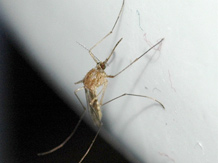Articles

Mosquitos that spread malaria are affected by weather conditions.
Climate experts join international health conference
Climate and health experts from the Met Office and the University of Exeter will be heading to Africa for a conference to help fight life-threatening diseases across the continent.
Discussions aim to find out how weather forecasts and climate science can be used to help limit outbreaks of meningitis, malaria, and other conditions affected by weather.
Research has shown that malaria outbreaks can be affected by rainfall patterns, while the risk of contracting meningitis can increase in dusty conditions which help the bacteria spread.
Excess heat can also be a major health risk, while weather-related threats to food and water security can also be forecast in advance.
Head of Health Forecasting at Met Office, Wayne Elliott said: “The conference is important because it will set the scene for the next 10 years in terms of how climate research centres and national weather services in Africa respond to the needs of their health systems and populations.
“The decade to come is likely to throw some significant weather and climate challenges at the people of Africa, so this conference must create an environment where things can change for the better.”
When in Africa, Met Office and Exeter University experts will join representatives from NASA, Google, and the International Research Institute for Climate and Society at Columbia University, to share and discuss the latest developments in weather impacts and climate science.
Dr Dan Bloomfield, who coordinates combined health research projects between the Met Office and University of Exeter, said: “To understand the relationships between weather, climate and health risks better we need to analyse information from all these areas. The Met Office has a justifiable claim to be one of the leading centres in the world at this, and that expertise is backed up by the statistical expertise at the University of Exeter.
Dr Bloomfield added: “We can forecast these risks perhaps four or five days in advance, but we need to look at the best way of communicating often complicated information to rural and undeveloped areas.”
Representatives from 30 African countries are due to take part in the event in Addis Ababa, Ethiopia, which will take place between the 4 and 6 April.
The Met Office and the University of Exeter have already worked together looking at how climate affects the spread of dengue fever in Brazil. It is hoped that discussions in Africa will deliver more results which help to tackle health risks across other parts of the world.
Date: 5 April 2011
